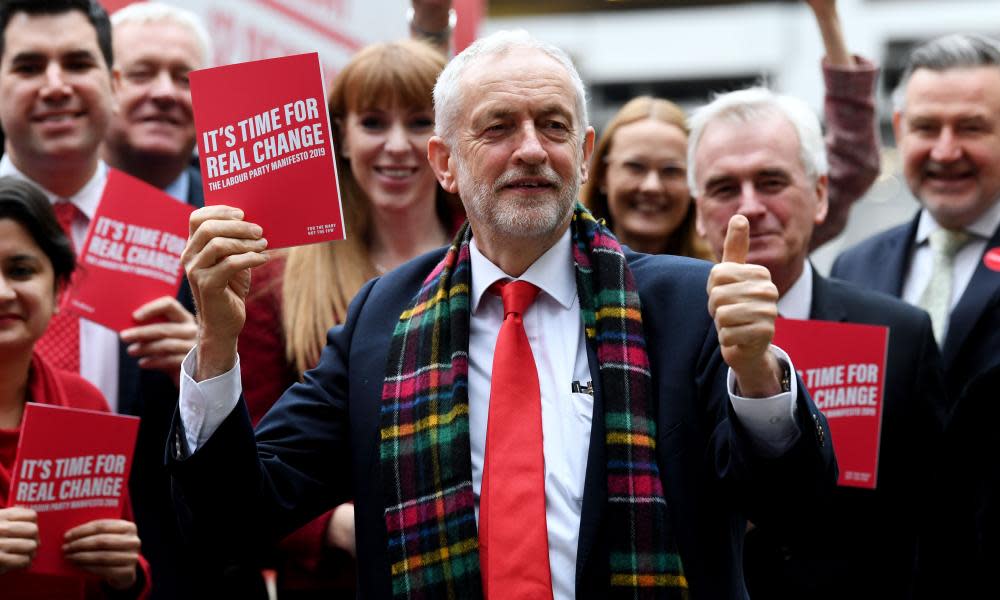The Guardian view on the Labour manifesto: bold pledges for anxious times

Labour’s 2019 general election manifesto, launched on Thursday by Jeremy Corbyn, is its most radical in more than 35 years. It will strike a chord with millions who want categorical change in Britain. The chord will be loudest with those who have seen life chances stall and fracture, and communities weaken, during the fiscally strangulated years that have followed the financial crash. It will ring out, too, for those who want inequality reversed, taxes increased to renew public services and the climate crisis placed at the centre of public policy.
The manifesto raises the bar. Its ambitions match the seriousness of the times. The green agenda is the single most important pledge, an overarching imperative. But it is not the only issue the manifesto confronts in bold terms. The neglect of towns and regions, the need for modernised transport and infrastructure, the importance of reskilling, and of rights against employment injustice, the case for affordable housing, the demands for child and elderly care, a better deal in education and health spending all cry out too.
The manifesto is not historically as startling as it will be caricatured as being. The Britain that Mr Corbyn and his supporters are imagining is a leftwing form of social democracy for which, with relatively few changes of policy, it might have stood at various times between 1945 and 1983. Mr Corbyn is explicit that he wants to roll back the deregulatory revolution of the 1980s and restore tax and spend, national provision of social goods, and the state-managed sector – issues that were bedrocks of the postwar economic settlement – to the heart of public policy from which Margaret Thatcher expelled them. He wants to see the forward march of labour, which was halted in those years, resumed.
But we are on the threshold of the 2020s, not the 1970s. The single most consequential thing that will be decided on 12 December is the enormity of Brexit, which will shape everything else that any new government, Labour or not, attempts in the new decade. Mr Corbyn’s Brexit offer is ambiguous. He will not say if he wants Britain to remain in Europe or not – and Labour is badly harmed by his evasion.
Mr Corbyn is ambiguous too in his trade union agenda. Yes, employees absolutely need a stronger voice in their workplaces and over their terms and conditions. But what exactly does Labour mean by the repeal of “anti-trade union legislation” and scrapping “unnecessary restrictions on industrial action”? Over-mighty unions were part of the dark side of the 1970s. Enthusiasm for Labour’s general ambitions should not mean a free pass on such issues.
Labour’s approach speaks to and connects with the deep injustices and unfairnesses of modern Britain. But a manifesto must be more than a utopian wishlist. Planting lots of trees is magnificent. But money does not grow on them. Even in tough times like these, and even in the face of Boris Johnson, a Labour manifesto is only as inspiring as its implementation is credible and as its party leader inspires confidence.
Neither of these is a given. Pledges like scrapping universal credit, keeping the state pension age at 66 and abolishing tuition fees will be popular, but they carry big price tags, not all of which will be paid by the super-rich or business. “These are vast numbers, enormous, colossal,” said the Institute for Fiscal Studies. It added that Labour’s claim that only higher earners would pay higher taxes was “not credible”. Mr Corbyn has three weeks to win this argument.
Just as questions of affordability cannot be wished away, so Mr Corbyn’s net dissatisfaction rating of minus 60 among voters cannot be ignored either. The Labour leader’s response on Thursday was to defy such scepticism. He would accept the hostility of the rich and the powerful, he said, echoing Franklin Roosevelt. Current polling suggests that many who are neither rich nor powerful have doubts too. Labour’s manifesto may in the end be more effective in consolidating the left’s control of the party than in transforming the most important election in decades. Mr Corbyn’s manifesto will raise many spirits, as its predecessor did in 2017. The question now is whether its strikingly ambitious radicalism can change the election outcome.

 Yahoo News
Yahoo News 
